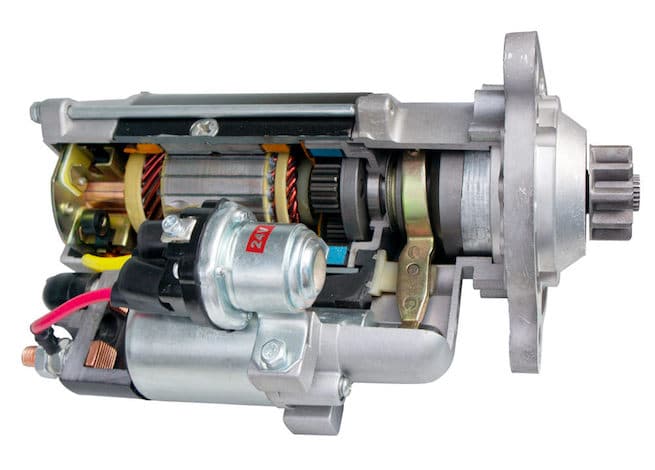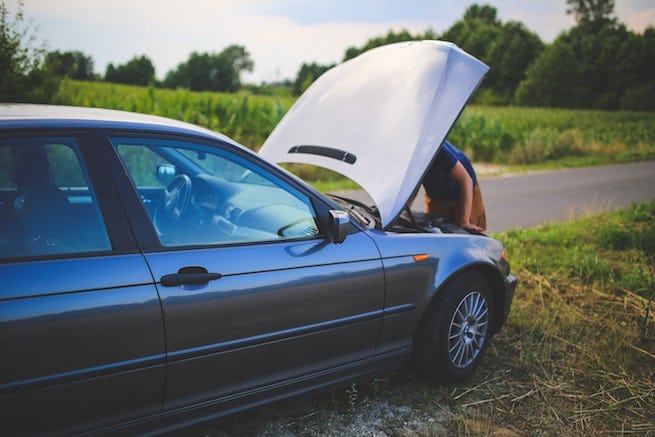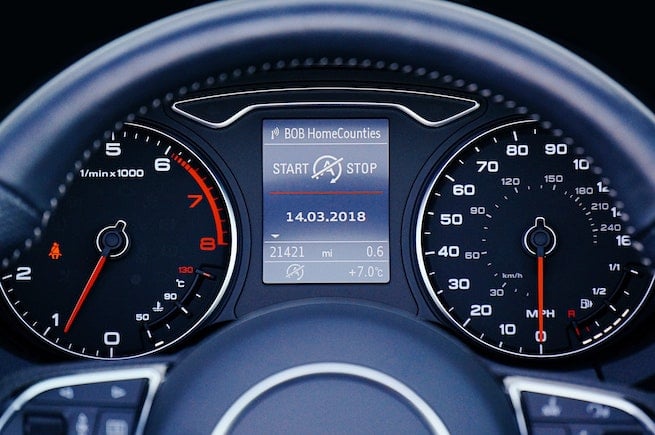10 Symptoms of a Bad Starter Motor [My Car Won’t Start?]
Oh, man, you’re late! Gotta hurry, gotta get out the door! You’ve got that big meeting! You race out to the car, stick your key in, turn it, and nothing happens. What’s going on? You’re not a mechanic, and you don’t know the first thing about cars!
No worries; this post will help you identify different symptoms of a bad starter motor and what to do about it. When your car won’t start, there’s a lot of things that could be going on, and you’ve more than likely checked the main ones.
For example, if your radio still plays or your dash lights still come on, that means it isn’t your battery, that’s the problem. If the engine still makes that sound like it’s trying to start, that means you have a different problem on your hands. More so if the check engine light is on.
10 Bad Starter Symptoms or Warnings Signs

Every time you drive your vehicle, car, SUV, or truck, gas, or diesel engines, it is the starter that first turned the engine, causing it to start. If the starter motor is worn out or stops working, you are not going anywhere until the problem is repaired.
There are several symptoms of a faulty starter that is beginning to fail. There are also several reasons a perfectly good starter does not operate. We explore some of these bad starter symptoms in the following post.
1. Grinding noise when starting the engine
Car operators usually hear this noise when the gear that engages with the flywheel is worn out or does not engage properly with the flywheel. Failed bearings inside the starter could also generate a grinding noise. Either way, your starter should be replaced. Failure to replace it could cause damage to the flywheel, slow cranks, and frequent battery checks.
2. Free wheeling
Every starting system has a sprocket that engages with the flywheel when the starter shaft begins spinning. This gear or sprocket occasionally seizes and does not engage with the flywheel of the engine. The starter spins at high speed, e.g., freewheeling. The starter system may need to be replaced. At the very least, the shaft may need lubrication so that the gear can slide freely on the shaft of the starting system.
3. Clicking sound
The starter draws high amperage when it engages with the flywheel. If the electrical connections are loose, the starting system may attempt to spin up, engage with the flywheel, and slowly crank the engine or not have sufficient power to turn the engine over. Constant clicking noise may be heard each time the gear attempts to engage with the flywheel. If the engine wont start or persist with start issues then it might need a starting system replacement.
4. Smoke when car owner cranks the engine
A starting system can generate smoke for several reasons when the car owner attempts to start the car. It is a mechanical system powered by an electric current at high amperage. The starter’s circuits may overheat from continuous cranking in an attempt to start the car. Heat is generated under these conditions in the wiring, on the armature, or even on the electrical wires feeding power to the starter.
5. Weird smell when cranking the car
If you smell smoke or a weird smell coming from the area of the engine, specifically the area of the starting system, it could be burning wiring inside the starter. Never crank the car engine for an extended period of time. Allow the starting system and wiring to cool down between attempts to start the engine. Your battery can also recover faster if you wait a few minutes between attempts to start the engine.
6. Oil has soaked the starting system
Occasionally oil drips down from other areas of the engine onto the starter. As the starting system heats up from excessive cranking, the oil may smolder, causing an oil-like smell or even smoke. The oil may also affect some of the electrical circuits and cause intermittent starting circuit problems. You may need to replace the starter as well as repair the oil leak, and make sure it is clean and tight.
7. Interior lights are on, but the car won’t start
If the interior lights are on and providing illumination at normal levels, but your starting system does not crank the engine, there may be an open circuit which stops the starter from receiving power. If the lights dim while operating the starter, there may be a short circuit somewhere in the ignition system. Verify that the vehicle’s battery is fully charged and have your car inspected as quickly as possible. The battery and dash lights are directly connected.
8. Malfunctioning Starter solenoid
A malfunctioning starter solenoid may work intermittently or not at all. The starter relay engages when the ignition key is turned and provides power to the starter. If there is no sound, grinding, clicking, or spinning and the lights are at their normal levels, your solenoid may be burnt out, or there is a loose connection. Arrange for a mechanic to inspect the electrical system components associated with the starting system to isolate the specific problem.
9. Starter stays on after engine starts
If the starter continues to spin after the engine starts, the starter gear may not have disengaged. Also, the solenoid may not have shut down the current feeding the starting system. There may be an electrical issue or a mechanical issue. Either way, shut the engine off immediately to avoid damage to the engine flywheel and starter. Arrange for an inspection by a qualified mechanic.
10. Intermittent issues starting the car
Intermittent issues while starting the car are among the most difficult to resolve. Check that all electrical battery cable connections are tight and that your battery is fully charged. Verify that there is no oil on the starter and avoid cranking the engine for long periods lasting more than a few seconds. Arrange for a mechanic to do an inspection with a charging system if your light dim when you turn the ignition key.
FAQs With Bad Starter Issues

The following are some of the most frequently asked questions that many drivers have regarding car starter issues and the solutions available. Maintenance tips include checking that your battery is fully charged. Once you have checked the battery, investigate other potential areas.
How do you know if you have a faulty starter?
Verify that your vehicle’s battery is fully charged, and the connections to your battery and the starter are tight, and battery terminals are not corroded. Bad connections can cause voltage drops. If there is a dead battery, the starting system can not operate.
The car battery alternator may not be charging the battery. Does the engine crank at average speeds when you turn the key or depress the ignition switch on modern cars? If yes, it is probably not the starting system.
Smoke, grinding noises, loud clicks, your starter spins without engaging with the flywheel, and unusual smells from the starting system are potential indicators that your starter may need to be investigated and perhaps replaced.
At times the starters drive gear can also fail, and it is a common symptom that is related to a faulty starter.
Can you start a car with a faulty starter?
If the starter is not working at all and you have a manual transmission, the car can be started by pushing the vehicle and engaging the clutch once the car has reached sufficient speed. Ask your mechanic to test your starter drive, and get your battery tested as well.
If the starting system does not work on an automatic transmission vehicle, it may need to be towed to a garage for repairs. Intermittent starter problems may allow you to start your car. However, have it reviewed by a mechanic before the bad starter leaves you stranded.
How long should a starter last?
In many cars, the starting system may last the lifetime of the vehicle, while in other vehicles, the starter may last only five to seven years. The number of cycles, i.e., the number of times the starter is used to start the car, is also a factor.
Many starts and stops every day could mean that your starter is used to start your car more often than someone who only drives back and forth to work every day.
Can auto parts store like AutoZone test a starter?
Current online information suggests that AutoZone, an auto parts store, can test many vehicle components, including your starter, while it is still in your car. Consumers can also bring starting system into AutoZone for testing, as well. For this you need to make sure there is no clicking noise when you turn the ignition system.
AutoZone can test your starter for free and recommend whether it should be replaced based on the test results. Taking your car to an auto repair shop is a must, especially is the battery light is on. They can tell you if your battery is dead, and might fix it with a charging system.
How much is it to replace the starting system on your car?
Fortunately, starters aren’t terribly expensive, and they aren’t too difficult to replace. Most starters are around $100. If you have one of the high-end, fancy cars, they may be $200 or more. They usually take less than two hours to install. So, on average, it should be less than $350 in total.
What does a Faulty or failing starter sound like?

The first step is to confirm your battery is fully charged and all connections are tight and not corroded if you are having difficulty getting your car started. A faulty starter can make several different sounds depending on what is the issue. These sounds can include:
- Grinding noises
- Loud clicking sounds when you start your engine
- High-speed free-wheeling or whirring sounds
- High pitched or high frequency screeching noises
- Check the starter for signs of defects
- Replace the starter to avoid future issues
If you crank your car and no light come on, then try replacing the battery. Hence, you can expand the life of your car with preventative maintenance like tire balancing and oil changes.
When the problem is out of your hands, no worries, your mechanic has a diagnostic tool that can help you solve most problems.
How do you tell if it’s your starter or your battery?
If the lights on your car are dim, especially when you try to start your car, it could be the battery. Check that all battery cable connections are tight and not corroded. Clicking sounds from the starting system suggest that it is not receiving sufficient power.
Freewheeling starter sounds indicate that it is a starter problem. Grinding noises also suggest a starter problem. If the starting system engages with the flywheel and cranks the engine without the engine starting, investigate other reasons for your engine not starting.
Avoid continuously cranking the engine. Your starter could overheat and cause permanent damage to a good starter. Get your battery tested and eliminate the doubt right away. If you have a jumping battery cable, you can try jump-starting your car.
However, if the lights on your dashboard are on, then most likely your cars starter needs to be replaced. Regular car maintenance may also uncover some of these issues before affecting the operation of the vehicle. Regularly scheduled maintenance should include:
- Spark plugs
- Oil changes
- Wheel alignment
- Brakes and pads
- Exhaust system
- Fuel filter
- Air filter
- Car air conditioning system
- Starting system
- Safety switches
Avoid operating the starting system for more than five or 10 seconds. Your starting system could overheat, causing damage to a good starter. Has your vehicle inspected by your regular auto care mechanic for the appropriate car repairs?
Regular car maintenance may also uncover some of these issues before affecting the operation of the vehicle. Also, periodical tire balancing can improve the performance and lifespan of your car.
Bad Starter Symptoms Summary
Well, pardon me for my thoroughness! If you’d like, the following video gives a good overview of what problems with no start scenarios can mean, as well as some quick first steps you can take to help diagnose them.
So! If your symptoms match up to what we’ve covered here, go ahead and call that tow truck, find that garage, plan to camp out for a few hours. Once the parts are all replaced and installed, you’ll be all squared away and good to go. Also, verify if there is any problems with the pinion gear on your started car.
Bad starter motors can leave you stranded when the starter fails to operate. However, use a process of elimination to ensure that it is not a bad battery or battery that is not fully charged. Confirm that all connections are tight and not corroded.
Listen for telltale sounds and observe the engine for smoke around the starting system. Check for a bad alternator if the check engine light does not turn off. Replacing the battery won’t help your starter is faulty or not working correctly.
Hence, it is of good practice to keep your starting circuit in shape to avoid problems with the electrical system. That is all for now, make sure that the mechanic has checked the battery and that they apply electric current before you replace the dead battery. Try everything mentioned above until your car runs.
Last Updated on: January 12, 2023

